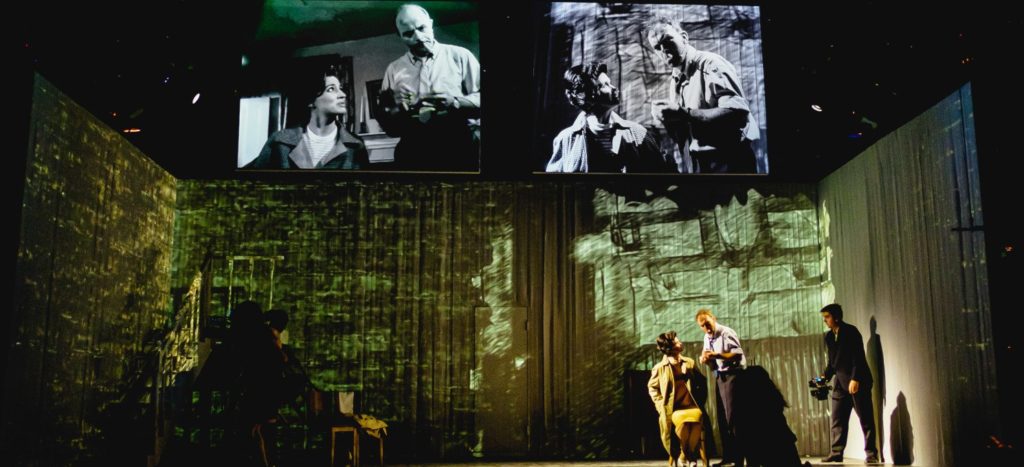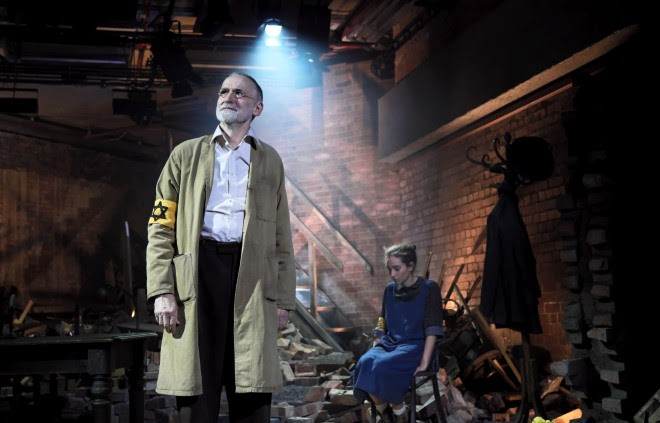
REVIEW: Night Of The Living Dead – Remix, Leeds Playhouse/Imitating The Dog, Courtyard Theatre, Leeds Playhouse, until February 15; Dr Korczak’s Example, Leeds Playhouse, Bramall Rock Void, Leeds Playhouse, until February 15. Box office: 0113 213 7700 or at leedsplayhouse.org.uk
FIRSTLY, apologies for the tardy reviewing, but there is still time aplenty to see these two contrasting yet equally impactful productions at the restructured Leeds Playhouse.
The human condition, what we do to each other, lies at the heart of both pieces, and at a time when the divisive aspects and little island mentality of Brexit are coming home to roost after cutting the umbilical cord with Europe on January 31, they are even more resonant.
American film-maker George A Romero, from The Bronx, New York, would have turned 80 on Tuesday, making Leeds Playhouse and cutting-edge Leeds company Imitating The Dog’s co-production very timely.
Romero’s trademark was gruesome horror movies, satirical in tone yet serious in their message, delivered as it was through depicting variations on a zombie apocalypse. Night Of The Living Dead, from 1968, set the template and here comes a Remix that is at once theatrical and filmic.
In a city where football coach Marcelo Bielsa preaches the value of repetition, yet still with unpredictable results, the Playhouse/Imitating The Dog company sets itself the challenge of mirroring Romero’s film, frame by frame. The two are shown side by side on screen, synchronised in motion with actors saying the lines.
Your gaze goes from screen to screen but also you watch the actors in the act of re-making the film, switching between performing and working the cameras, and defying the odds in pulling off the feat when seemingly always up against the clock with the need for improvisation, confronted by limited resources. Round of applause, please, to Laura Atherton, Morgan Bailey, Luke Bigg, Will Holstead, Morven Macbeth, Matt Prendergast and Adela Rajnovic.
You find yourself appreciating a “dance” show as much as a theatre and film one, because the movement across, on, off, and around the stage has the ebb and flow of choreography. Another round of applause, then, to co-directors Andrew Quick and Pete Brooks; projection and video designer Simon Wainwright; lighting designer Andrew Crofts; composer James Hamilton and on-stage model creator and operator Matthew Tully. Laura Hopkins’s set and costume designs are a show in themselves too.
Night Of The Living Dead – Remix is not a mere tribute act of breath-taking invention and bravura humour. Instead, it seeks to give 1960s’ American social and political context to Romero’s message by bleeding in film and sound of John F Kennedy, Senator brother Robert and Dr Martin Luther King’s famous speeches and the cast’s re-enactment of coverage of their assassinations. The words echo down the years, haunting and disturbing, all the more so when matched with a zombie apocalypse.

The Playhouse’s new third performance space, the Bramall Rock Void studio, made its autumn debut with Charley Miles’s all-female Yorkshire Ripper drama There Are No Beginnings, giving voice to a blossoming North Yorkshire writer.
Now it turns the spotlight on the Holocaust in a Playhouse production timed to mark Holocaust Memorial Day(January 27) in a city with both Jewish and Polish communities. Playhouse artistic director James Brining had commissioned David Greig to write Dr Korczak’s Example when working in young people’s theatre in Scotland 20 years ago for performances in school halls, and on moving to Leeds he read it with the Playhouse youth theatre “a year or so ago”.
That prompted Brining to direct this winter’s production, turning the spotlight anew on the Polish Jewish doctor, children’s author, storyteller, broadcaster and educator Janusz Korczak, who brought liberal and progressive ideals to running a ghetto orphanage for 200 children in Warsaw.
His principles live on, becoming the basis for the United Nations Convention on the Rights Of Children that still prevails. That is the history and the present of a story that Greig turns into a play set in 1942 that is at once grim and yet hopeful because of the example of the title that Dr Korczak set.
Brining’s production is supported by the Linbury Prize for Stage Design, a prize for emerging designers that sees set and costume designer Rose Revitt turn the new studio back to rubble, with piles of bricks, dusty furniture and desks.
Greig’s play is a three hander, wherein Playhouse regular Rob Pickavance brings gravitas, warmth and sensitivity to Dr Korczak, while Danny Sykes and Gemma Barnett announce talents to watch.
Sykes plays Adzio, brittle, brutalised and psychologically damaged at the hands of adults, his 16 years of childhood stolen from him, as he becomes the latest child to be taken in by Korczak. Barnett’s Stepanie is a beacon, benefiting from Korczak’s care already and drawn to trying to help the deeply bruised Adzio.
David Shrubsole’s sound deigns and compositions complement the tone, Rachel Wise’s movement direction is as important as Brining’s direction, and the actors’ use of models (the size of Action Man, without being glib) to play out several scenes has a powerful impact too.
Having a recording of Leeds children reading Dr Korczak’s principles for children’s rights to freedom, respect and love at the play’s close is a fitting finale, one that echoes into the Leeds night air.
Charles Hutchinson
